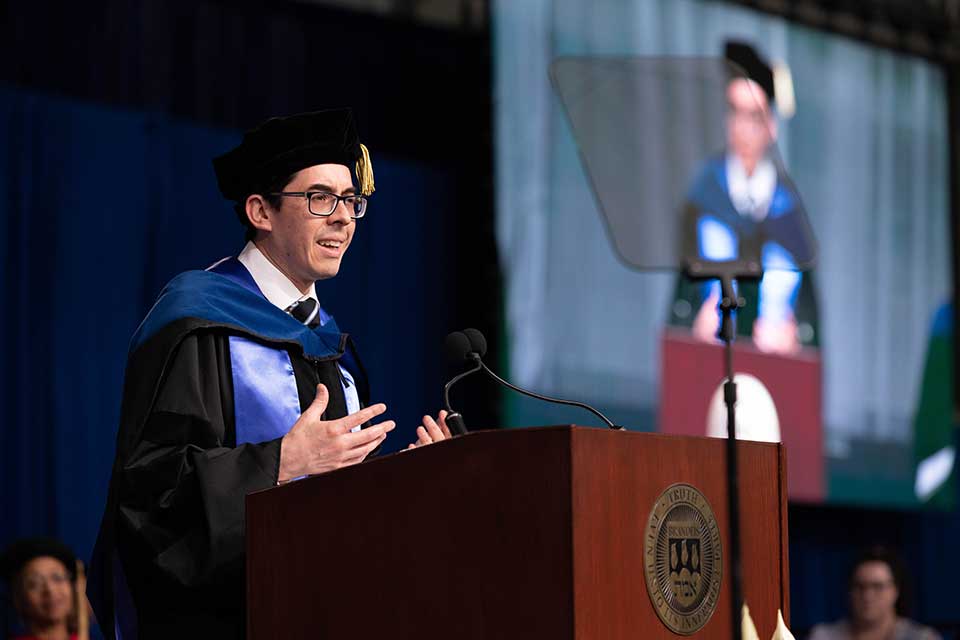Graduate Student Address by Emiliano Gutierrez-Popoca, GSAS PhD’23

Emiliano Gutierrez-Popoca, GSAS PhD’23 delivers the Graduate Student Address during Graduate Commencement at Brandeis University on May 21, 2023.
Transcript
President Ron Liebowitz, members of the board, alumni, fellow graduates, families, friends, Brandeis faculty and staff. I am honored to speak to you today.
Whenever I had doubts about my capacity for completing a graduate program, I thought back to the time I was about to start elementary school. I remember talking to my mom about how I was not sure I would make it in elementary school because I thought it would be too difficult. As you can imagine, she was bemused by a six-year-old's concern for academic achievement. But she said I shouldn't worry too much about that because she would be there to help me along the way. Both my parents were academics and throughout my education, they gave me invaluable support well beyond elementary school. So after all, thanks to them, my academic career did not end after preschool.
Support from those around me has always been there for me throughout my academic life whenever I have faced this insecurity. For me, as for many graduate students, impostor syndrome has been an unwelcome companion. In the back of my mind I often thought I could not live up to the high standards of a university and a program known for excellence. Indeed, the intellectual effort, the workload and the pressure of graduate programs often tests students' confidence to the point that some of the most brilliant people come to doubt they belong in graduate school at all.
Today, I would like to share with you how throughout my experience at Brandeis, community support has been a defining way of overcoming this lack of confidence. Many times when impostor syndrome has loomed on my grad school path, it has been as a result of thinking that I had to be self-sufficient in whatever work I produced. After all, graduate education, at least in the humanities, privileges individual research and originality. That is why it's easy to think that academic achievement stems only from isolated individual effort, when in fact, it can only flourish within a network of support.
In my time here I took advantage of almost every resource at Brandeis. I held in my hands Shakespeare's First Folio at the Brandeis Special Collections, and found rare books and articles thanks to devoted librarians. I received career advice from the International Students and Scholars Office and the Graduate School of Arts and Sciences teams. I swam in the pool, played basketball at the Brandeis gym and got medical attention at the health center after I got injured playing basketball. (audience laughs)
I also learned from my role as a supporter. I taught other grad students how to swim. I helped students write their first college essays and their grad school applications at the writing center. I was an instructor in writing literature and film from Shakespeare to "The Princess Bride". From this wide array of experiences being helped and helping others, I realized the enrichment that belonging to a community brings to all its members. Furthermore, I have come to the greatest breakthroughs of my PhD through the support of staff, peers, and friends, and through the mentorship of Brandeis faculty.
My mentors have bolstered my confidence. But more importantly, they have shaped my research and practice by asking difficult questions. When I started my PhD, I knew I wanted to study Shakespeare and Renaissance literature, but I still needed to grow intellectually before writing a dissertation and completing a doctorate. My advisors led me to gain new perspectives on works I had read many times, and they were interested in what I had to say about Shakespeare.
Therefore, only in dialogue with others have I realized the full potential of my own voice. After all, those who ask the most difficult questions are the people who think you have something to say. For that, I am thankful for Brandeis professors who are devoted to helping students, but are not afraid to challenge them.
Grappling with these new challenges made me realize that the difficulties I faced did not mean I was an impostor. They meant there was room for professional growth. That is why the support of the Brandeis community has helped me whenever I've doubted my own capacity since I have seen myself reflected in the talent and dedication of such a welcoming group of people.
Completing this milestone leads me to reflect on the deep interrelation between the tradition of rigorous, innovative academic work and the value of inclusivity at Brandeis. I believe that the fact that Brandeis welcomes all of us makes it a center for vibrant academic achievement so that the community, not only its members, become stronger. I would like to conclude by expressing my wish that we take this value of inclusivity as we build communities in our careers beyond Brandeis. By extending the networks of support we have found here, we will be contributing to society not only by the application of our knowledge, but also by inspiring others to discover and use their talents. Thank you.